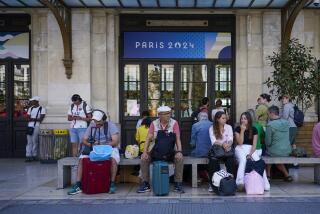Daylong Strike Nearly Halts Paris Metro
- Share via
PARIS — One of the world’s most efficient public transport systems came to a near halt Wednesday when almost all subway and bus workers of Paris took part in a 24-hour strike in the first test of strength between labor unions and the new conservative Cabinet of Premier Jacques Chirac.
However, the city was neither in paralysis nor chaos. Parisians, heavily dependent on the public transportation system, had been warned for almost a week and changed their travel plans to deal with the difficulty.
Many walked to work on a drizzly, cool day, drove their cars in a crawling search for parking space in the center of the city, or stayed home. The Paris police superintendent’s office had warned, “Do not come into the city unless it is absolutely necessary.” Many schools shut down.
Walkout 90% Effective
All but one of the five unions that represent transit employees were on strike in protest against budget cuts that would freeze salaries and eliminate proposed new jobs. It was estimated that more than 90% of the employees did not work.
The conflict has strong political overtones. Only a few days ago, the Chirac Cabinet forced the resignation of Claude Quinn, a Communist, as director general of the Paris transportation system after he objected to the budget cuts. The Communist-dominated General Confederation of Workers is the largest union in the Paris system, representing 41% of the subway and bus workers.
The strike also seemed to reflect the union leaders’ concern over legislation that would allow employers to dismiss workers without asking for approval from the government.
More tests of strength between labor and the government are imminent. Workers have scheduled a strike today on the French Railways. Other public services strikes or brief work halts are expected in the week ahead.
Eerie Scenes
The Paris Metro--as the subway network is called--did not close down but operated only intermittently. The scenes in the Metro were eerie. No one sold tickets. Gates were open for passengers to slip in free. Passengers, many of them tourists, fidgeted and waited at the station for trains that came every hour or half-hour. Footsteps resounded in click-clack echoes whenever a passenger decided to walk through the nearly empty, tube-like passageways from one subway line to another.
At one point during the day, the Paris transport system reported that only 27 of its usual 465 Metro trains at that hour--a little more than 5%--were running. About one out of five suburban trains were running. Fewer than one out of 10 buses were on the streets.
Budget cuts of $40 million were made by the Chirac Cabinet after it was appointed in March, the result of the Socialist Party’s defeat in legislative elections. President Francois Mitterrand, a Socialist, remains as head of state with powers that go beyond merely titular duties.
Eliminating 200 Jobs
The budget cuts would eliminate 200 extra jobs promised by Quinn.
Paris uses public transport extensively--an average of almost one ride per person a day in the metropolitan area. With a population of 2.5 million within the city of Paris and 8.5 million in the entire metropolitan area, Parisians take 5 million Metro trips a day, 3 million bus trips a day and 1 million suburban train trips a day. The transport system has 4,000 buses, 3,005 subway cars and 880 suburban train cars.
Extensive public transport strikes have been relatively rare in Paris. But the city was paralyzed last Dec. 20, when workers staged a wildcat strike to protest the conviction of a train conductor for causing an accident. Since the strike was not expected, Parisians were caught unprepared. The last extensive one-day strike called by the unions for higher wages came in 1977. The conservatives ran the government then, as well.
More to Read
Sign up for Essential California
The most important California stories and recommendations in your inbox every morning.
You may occasionally receive promotional content from the Los Angeles Times.













